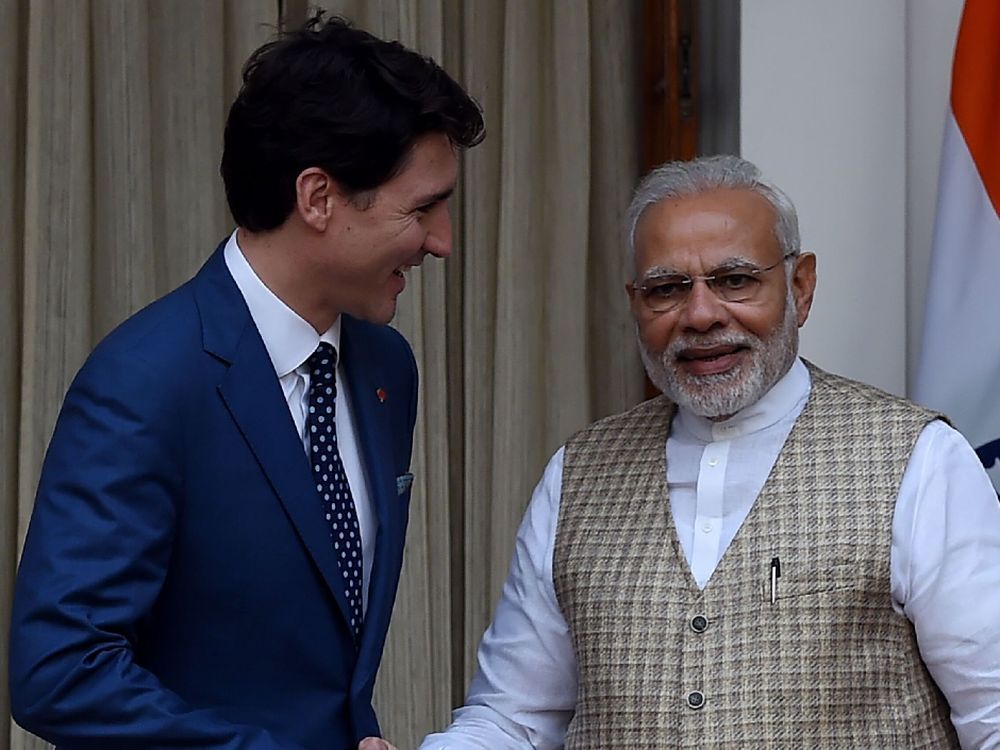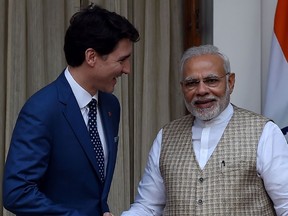Canada and India agree to relaunch trade talks, as democratic nations seek to strengthen ties to counter China, Russia

‘I think what is really important is the resilience of the post-pandemic supply chain and trade is a proxy for democratic values,’ Trade Minister Mary Ng said

Article content
Trade Minister Mary Ng landed in India on March 10 and is leaving her two-day trip with a win: the relaunch of trade negotiations with the world’s sixth-largest economy, her ministry announced on March 11.
Advertisement 2
Story continues below
Article content
Canada and India are often described as natural trading partners, but a relationship that looks good on paper hasn’t translated into a progress at the negotiating table. Canada and India first began trade talks in 2010 under former prime minister Stephen Harper, but after 10 rounds of talks over seven years failed to produce a breakthrough, the effort lost momentum. The two sides haven’t held formal discussions since August 2017.
The world has changed since then. The reboot comes amid heightened concern among democratic powers such as the United States and Germany about China’s influence over the global supply of everything from the rare minerals needed to build electric-vehicle batteries to the consumers goods sold at Walmart Inc.’s stores. Russia’s invasion of Ukraine this month only added to the urgency for like-minded nations to strengthen ties.
Advertisement 3
Story continues below
Article content
“The situation that is in front of us really shows the importance of partnering with allies on building resilient supply chains,” Ng said in a telephone interview from New Delhi. “What is really important is the resilience of the post-pandemic supply chain and trade is a proxy for democratic values because trade, and certainly how Canada trades, is a commitment to the rules-based international order.”
-

Canada has bungled trade deals with India in the past. Could COVID and China finally unite the two?
-

Trudeau’s Asia strategy is shifting after India and China deals proved difficult to tackle
Ng’s successful stop in India was the first leg of a six-day tour that will also take her to Israel and the West Bank, and the United Arab Emirates.
Advertisement 4
Story continues below
Article content
India has a reputation as being a difficult negotiating partner, and while Prime Minster Narendra Modi has happily accepted international investment since coming to power in 2014, he has been less keen to lower barriers that might open domestic producers to import competition.
Still, India’s rivalry with China might be causing Modi to reconsider his approach to trade. Soldiers from the two countries have engaged in fatal skirmishes along a disputed border in the Himalayas in recent years, and China is backer of Pakistan, which India’s leaders view as an existential threat. In May 2021, Modi’s government agreed to kickstart trade negotiations with the European Union, reviving talks that had been stalled for eight years.
Advertisement 5
Story continues below
Article content
The pandemic also is driving a renewed commitment to trade in countries that got used to importing cheap goods from China. Gummed up supply chains exposed the fragility of advanced economies’ reliance on the world’s biggest manufacturer. India, whose population is on track to surpass that of China within a decade, could be a counterweight.
“Simply put, there is no path to a successful Indo-Pacific strategy without going through India,” the Business Council of Canada said in a statement.
Rather than get bogged down trying to finish a traditional trade pact, Ng said that India and Canada would first draw up an “Early Progress Trade Agreement,” a preliminary deal that would “set the stage” for a comprehensive agreement later.
Advertisement 6
Story continues below
Article content
Trade is a proxy for democratic values
“That demonstrates out ability to work together but most importantly, indicates to business and investors in both countries, in both economies, that we’re serious about creating those rules that they are looking for,” Ng said. “Those rules actually create confidence.”
Ng and her Indian counterpart’s negotiators will attempt to create a comprehensive economic partnership agreement, a more modern trade deal that takes into account not just goods, but services, investments, data-sharing and labour mobility.
That would facilitate and expand Canada’s existing trade with India, which amounted to US$6.29 billion in 2021, a 12 per cent increase from the previous year. Canada will seek to strengthen trade in agricultural products, textiles, energy, electronics, minerals and metals, urban development, information technology and tourism. Ng’s negotiators will also “undertake intensified work” to having India recognize pest risk management system for lentils and other pulses.
India is the world’s largest market of vegetarians and Canada is its biggest supplier of plant-based protein. Yet Canada and other pulse exporters have faced steep tariffs on peas, lentils, and chickpeas since 2017 for no apparent reason other than India’s desire to protect local farmers from foreign competition.
“I got to make sure that I keep doing this work to create the right conditions for businesses to export but to also attract the investment flow into Canada with one thing in mind: growth,” Ng said.
Advertisement
Story continues below







